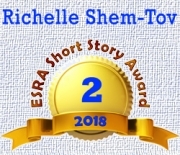The Clock
Gaza: July 2014
The soldier boy opened his eyes slowly. Where was he? His head ached, his body ached, his throat felt parched. And all around was total silence, except for the ticking of a clock, loud in the quietness of the dark space. Then the clock chimed, startling, yet familiar. Could he be at home in Tel Aviv; could those be the chimes of a clock, brought by his grandparents from a distant land? He tried to call out but no sound came from his throat. He tried to get up but found he could not move. His water bottle was flung to the side, beyond his reach.
The clock ticked on and the first light of dawn filtered in through the gaping cracks in the remains of the surrounding walls. It slowly lit up the rubble and the concrete blocks, one of which lay across his legs; the smashed furniture, torn curtains hanging from torn-out windows; bits and pieces of what was once a home. A single section of a wall on the inside of what was once a room remained intact. It had somehow survived the massive bombardment.
The sun shifting in, undisturbed in its course, threw its light onto this wall. On it was a picture hanging crookedly, desperately holding on, its glass pane shattered, allowing through only fragmented, colored smudges. And hanging beside it, an old pendulum clock, in a dark brown wooden case, now covered with the white dust of smashed concrete, no less a stranger in this place, than he himself. He wondered how it had got here. The clock, miraculously undamaged, ticked away, declaring without question the advancing day.
He then heard something else, the sound of approaching steps and he made out the figure of a man, a boy really, clambering over the rubble, lifting stones, moving aside concrete blocks. He watched the boy lift up a box, a bag, a hammer, then a ragdoll without an arm and place them onto a wheel-barrow nearby. He watched him make his way towards the clock, gently removing it from its hook on the wall. Their eyes met. The soldier muttered through his parched lips "water", almost the same word in Hebrew as in Arabic. He saw in the boy's unusual olive-shaped and olive-colored eyes fear, hate and anger being replaced by compassion and sorrow. The boy placed the clock on a pile of rubble, the persistent ticking becoming ever louder, and he reached out for the water bottle. He knelt down and, supporting the head of this other boy, this soldier boy, helped him drink.
They both heard it at the same time – the sound of approaching boots and shouting – the soldiers were searching for their missing comrade and they called out his name. The boy dropped the water bottle and dashed through the jagged opening towards the street. The soldier boy lay pinned under the concrete, unable to call, unable to move. Then he heard a shot, a gunshot, piercing the air like a knife, he heard the thump of the falling body. He imagined the eyes – the compassion turning to fear, then confusion, then - nothing. The clock relentlessly ticked on.
The Sheba Hospital Rehabilitation unit, Ramat Gan.Three months later.
The soldier boy and his physiotherapist sat down for a brief break during their morning therapy session.
"You are doing well," she said. She spoke fluent Hebrew with just a trace of an Arab accent.He was doing well and had begun to walk. The busy days, intense rehab and companionship of staff and fellow patients, many ofthem, soldiers like himself, brought welcome escape from memories of the war. At night though, as he lay in bed, these same memories would force their way back into his mind. They were blurred and distorted like a shattered picture, allowing through only fragmented, colored smudges. He desperately tried to fit the pieces together.
He looked into her olive-shaped, olive-green eyes – he had noticed that sometimes a shadow of sadness would cross those usually smiling eyes. Throughout the period that she had been treating him he had tried to recall why she seemed so familiar. Now, as they sat together, it all came back to him. He knew exactly where he had seen eyes and a face so like hers. It was as if a veil had been lifted and opened up those hidden wounded memories. He told her the story of his injury and of the boy who had given him water.
He saw the look in her eyes change to one of profound sorrow. She hesitated momentarily and then told him her story: "My home is in Jaffa. My father's family has been there for generations.Until the 1948 war my maternal grandmother's family lived in Ashkelon, then a large Arab town.During that war many of her relatives fled to Gaza and have lived there ever since. My grandmother however married my grandfather and remained with him in Jaffa".
"Just three months ago in Gaza", she continued, "towards the end of the recent armed conflict, a young cousin, one of the family sons, was shot and killed outside the bombed remains of their home. He had gone there in search of the family clock".
Their eyes met in the startling realization that she, his therapist and healer was that boy's cousin. Perhaps this strange coincidence could be a kind of serendipity, one that could lift a heavy burden haunting these two young souls.He gazed into her olive-green eyes and recalled again the relentless ticking of the clock.








Comments